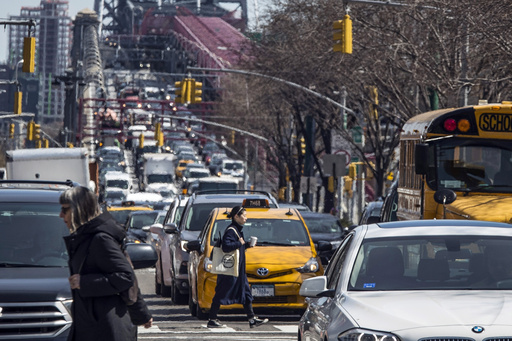
NEW YORK — In an effort to not upset suburban commuters ahead of an election year, New York Governor Kathy Hochul put the brakes on a previously planned tolling system aimed at reducing traffic congestion in Manhattan. This initiative, the first of its kind in the U.S., proposed a fee of $15 for vehicles entering the most congested areas of the city. Hochul expressed concerns about introducing such financial burdens on drivers and businesses at that time.
With anticipation building around President-elect Donald Trump taking office, Hochul is now expediting the relaunch of the congestion pricing plan before Trump potentially scrapes it altogether. On Thursday, she introduced a new proposal, suggesting a reduced fee of $9 for most vehicles. This initiative aims not only to alleviate congestion but also to support the beleaguered public transit system in New York City.
“I’m excited to announce a way forward that not only funds the MTA but also eases congestion and helps retain money for our commuters,” Hochul remarked. The new fee would apply to most vehicles driving into neighborhoods south of 60th Street and would be gathered through license plate recognition technology. This charge would be in addition to existing tolls enforced at various bridges and tunnels entering Manhattan.
The announcement has drawn the ire of public transit and environmental advocates, who had strongly criticized Hochul last spring when she temporarily suspended the tolling plans shortly before they were set to begin. Unlike New York, cities like London, Stockholm, Milan, and Singapore already have implemented similar congestion pricing systems. These systems aim to mitigate traffic levels and pollution while encouraging the adoption of public transportation.
Initially, Hochul had paused the tolls out of concern for New York City’s ongoing recovery from the COVID-19 pandemic. However, she also pledged that her decision was not final and that a forthcoming plan would eventually be released.
Transit advocates welcomed the news of the plan’s revival. Danny Pearlstein, a representative from the Riders Alliance—which had previously challenged Hochul’s decision—enthused that “congestion pricing cannot happen soon enough.” He added, “Once the first tolls are collected, we will finally breathe easier.” Likewise, Tom Wright, CEO of the Regional Plan Association, stressed that the return of the toll is crucial for not only New York’s transit system but also for the regional economy and air quality.
However, uncertainty looms over whether this revised plan will encounter opposition. Trump, whose residence falls within the congestion pricing zone, has been vocal against the initiative, labeling it as detrimental to businesses and residents alike. He previously stated on social media that he would work to abolish congestion pricing “in my FIRST WEEK back in Office!!!”
Originally authorized by state lawmakers in 2019, the initiative faced years of stalling during Trump’s administration, awaiting a mandatory federal environmental review that was eventually cleared by the Biden administration. It remains unclear if the adjustment of the toll amount might necessitate a reevaluation of this federal review.
Nicholas Klein, a Cornell University professor specializing in city and regional planning, suggested that once implemented, it’s usually more challenging to dismantle such systems. He noted, “Had the governor not interfered and delayed the plan months ago, congestion pricing could have already been in place, demonstrating its benefits and generating revenue for public transit.”
Additionally, questions remain on how the reduced toll will impact transit funding, given projections that the initial plan could have raised approximately $1 billion annually for various public transit services. Hochul assured on Thursday that the revenue generated from the lower fee would suffice to meet the Metropolitan Transportation Authority’s financial needs.
Political ramifications of the plan’s revival also cast doubt over Hochul’s popularity, especially among drivers. Suburban lawmakers have criticized the toll proposal. Republican U.S. Representative Michael Lawler emphasized that the congestion pricing scheme represents a significant tax burden for working families and daily commuters, while Laura Gillen, a Democrat from suburban Long Island, stated her opposition in a recent post, insisting on an end to such pricing efforts.
The future of congestion pricing in New York is thus an ongoing debate with implications for both the city’s commuters and its broader transit objectives.
